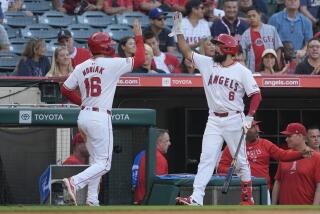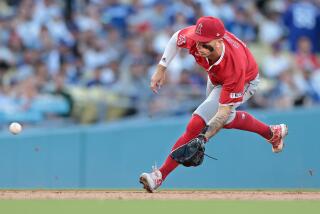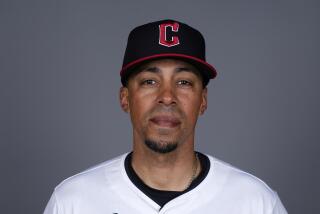Angels’ Kendry Morales has talent, desire by the boatload
Talk about a slump.
Eleven times Kendry Morales tried to leave his native Cuba. And 11 times he failed.
Go 0 for 11 on the baseball field, and you might wind up sitting on the bench for a game. Go 0 for 11 in attempted defections, and you wind up sitting in a Cuban jail for 72 hours.
Yet each time he was released, Morales went straight to the beach to try again. Not that he had much of a choice.
Months earlier, after a record-breaking season in the Cuban league, Morales had declared, “Baseball is my life.” But then he was suspended for speaking to an agent during a tournament in Panama -- something Morales says never happened.
“I knew that I was no longer going to be able to play baseball in Cuba,” he says. “That’s the only thing I know how to do: play baseball.”
He knew he would have to get off the island. On the 12th try, in 2004, a speedboat carrying Morales and 18 other Cubans made it safely to the Florida Keys, setting off a series of events that brought him here, to Angel Stadium, where later this week he’ll start at first base in Game 1 of the American League division series.
Along the way, Morales reunited with his mother, married, started a family and, in his first year as a starter for the Angels, put together one of the most productive offensive seasons in franchise history, batting .306 and leading the team in six categories, including home runs (34), doubles (43), runs batted in (108) and slugging percentage (.569).
As good as his new life is, however, Morales hasn’t forgotten what he left behind.
“Of course not, because, you know, you were born there, you have your family, all your people, your friends,” says Morales, who left everyone but his mother behind. “That’s what makes it a little difficult not to look back.
“Although you don’t want to remember, you do.”
Morales was born in Sancti Spiritus, a province in central Cuba whose name, in Latin, means Holy Spirit. When he was 4, his family moved to Cienfuegos on the southern coast, where his father worked as a foreman for a construction crew and played for the provincial baseball team. And because Kendry wanted to be like his father, at age 8 he started playing too.
He was soon playing better. By the time he was 18, the switch-hitter was selected to the island’s powerful national team, the first teenager to do so in nearly two decades. A year later, he batted .391 in Cuban league play and hit a game-winning grand slam in the gold-medal game of baseball’s 2003 World Cup.
A few weeks after that he played his last game for Cuba before being kicked off the national team in Panama and sent home from the Olympic qualifying tournament ahead of his teammates, charged with attempting to defect. Seven months after that, he left Cuba for good.
“He left home with some friends and never came back,” his stepfather, Henry Nunez, said. Morales was 15 days shy of 21.
“That it was a bad decision? I’ve never thought that,” Morales says now, five years later. “Because in Cuba I could never go any further in baseball. I had to leave.”
In the U.S., he knew he could go as far as his talent and desire would take him, and he had plenty of both. He also had quite an appetite, quickly ballooning from a rawboned 200-pounder to a stocky 225-plus.
Yet, aside from problems with fast food and English -- “I’m learning a little, getting a little better,” he says in Spanish -- Morales’ transition has been a smooth one. In four minor league seasons he never batted lower than .305, forcing the Angels to try to clear a place on the big league roster for him. That place became first base when Mark Teixeira left as a free agent.
“He was going to play somewhere,” Manager Mike Scioscia says. “By us not signing Mark, that opened up an opportunity for Kendry. He was going to get an opportunity, it just might not have been at first base.”
The Angels couldn’t have dreamed he was going to make such good use of that opportunity. Even Morales has been surprised. Having hit as many as 22 homers only once in the minors and having never driven in more than 71 runs, he set goals of 25 homers and 80 RBIs this season. He bettered both in less than five months.
“Going past your goals, that’s never bad,” Morales says with a smile. “But I never thought I’d have the results that I’m having.”
Especially at first base. In Cuba, Morales played all over the diamond, even pitching on occasion. So when he signed with the Angels, he really didn’t have a position.
“He showed good hands but he hadn’t played one position long enough to become proficient,” Scioscia says. “That’s the growth we’ve seen from him. I definitely thought he had the skill set for first base. I saw an incredibly high ceiling. As he got into his minor league career, you saw a guy who was ready for the challenge of the major leagues.”
In Cuba, the baseball guides still list the accomplishments of defectors, only now there is an asterisk next to the name and no official recognition of what the players do once they get here.
But Morales says family and friends follow his progress on the Internet, which may be as close as they’ll get to him for some time. After the playoffs, Morales plans to return home to Florida and prepare for his U.S. citizenship test, completing the trip he started in a speedboat off the coast of Cuba five summers ago.
--
--
(BEGIN TEXT OF INFOBOX)
Kendry Morales:
by the numbers
Angels first baseman Kendry Morales finished the season with a .306 batting average and led the team -- while ranking among the American League leaders -- in several offensive categories:
*--* Stat Team AL Doubles, 43 1st t-8th Home runs, 34 1st 6th RBIs, 108 1st t-5th Total bases, 322 1st 6th Extra-base hits, 79 1st 3rd Slugging %, .569 1st 2nd *--*
-- Kevin Baxter
More to Read
Go beyond the scoreboard
Get the latest on L.A.'s teams in the daily Sports Report newsletter.
You may occasionally receive promotional content from the Los Angeles Times.







